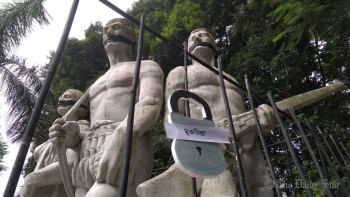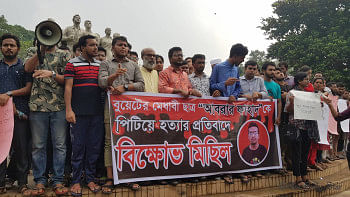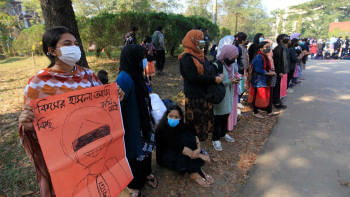The terror of Dhaka University’s guest room culture

Getting into Dhaka University is a dream-come-true for many, but those dreams are usually shattered when students encounter the harsh reality of this institution. Generally, new students cannot get accommodation in the dormitories – or residential halls. For those who do not have relatives nearby or the financial means to arrange off-campus accommodation, residential halls are their only option. However, the hall administrations ignore the students' plight by citing a lack of vacancy. Taking advantage of this situation, leaders of the student wing of the ruling political party place these unfortunate students in gono (common) rooms.
Take the case of Zahid, who enrolled at DU in 2018, for example. Attached to Surja Sen Hall, he was denied a room when he sought accommodation from the hall administration. Left with no alternative, Zahid appealed to a political leader and was ultimately allotted a space in one of the hall's gono rooms. This is a common story for almost all freshers at DU.
Every hall has at least one gono room. And the term lives up to its name. While a gono room is meant to house only four students, it is usually crammed with almost 20 people. The freshers do not have proper beds, lack basic hygiene facilities, and there is no space for even a study table. The rooms are akin to prisons, and during summer these rooms become hell on earth.
Informally, there are three types of guest rooms: general, mini, and single. In the general ones, all freshers stand amid their seniors every day and bear a flurry of profanities for their so-called misconduct; the profanities sometimes turn into physical violence. Mini rooms are more brutal than their general counterparts. There, a selective number of freshers with "severe faults" are abused. In the single guest rooms, only one victim is targeted and abused both verbally and physically within the four walls. Most of the severe levels of torture happen in the mini and single guestrooms.
While the nightmare begins with gono room placements, more sinister events follow soon after. At night, Chhatra League's second-year partymen summon first-year students and direct the latter to the hall's guest room, supposedly a place of hospitality. Far from a warm welcome, what the freshers experience there is nothing but hostility, alongside mental and physical torture. The guest room is synonymous with ragging or hazing: it is a place where the notion of senior students being supportive mentors quickly crumbles. A first-year student is taught "etiquette and manners," such as greeting seniors in a specific way, attending political programmes of Chhatra League, staying on call at all times, and not criticising the government. Those who fail to comply face brutal punishment, and even expulsion, from the halls.
Although all halls have actual guest rooms, the term has lost its literal meaning and is now used to categorise the manner of abuse that occurs in any of the hall's rooms. Informally, there are three types of guest rooms: general, mini, and single. In the general ones, all freshers stand amid their seniors every day and bear a flurry of profanities for their so-called misconduct; the profanities sometimes turn into physical violence. Mini rooms are more brutal than their general counterparts. There, a selective number of freshers with "severe faults" are abused. In the single guest rooms, only one victim is targeted and abused both verbally and physically within the four walls. Most of the severe levels of torture happen in the mini and single guestrooms.
Our recent study found that 27 DU students were tortured, mentally and/or physically, in 2022. However, we are aware that the actual number could be quite higher. Most incidents of torture go unreported as the victims are forced to stay silent. They are intimidated to such an extent that they sometimes withdraw complaints or do not even dare to complain to the authorities, thinking that the administration will not ensure justice. This shows a lack of trust in authority, which is sometimes tacitly responsible for perpetuating this guest room culture. In August last year, Chhatra League leaders confined a student over a message criticising their political programmes. Later on, after checking the victim's smartphone and accusing him of militancy, the hall provost handed him over to the police. The police, finding no prima facie evidence against the student, let him go.
Due to such incidents, victims prefer seeking solace and justice by publicising their suffering, talking about their condition through social channels, hoping for societal redress and resistance.
The hall administrations, even after being fully aware that Chhatra League assigns seats in the halls, turn a blind eye to this matter. The administrations' tacit compliance is deeply concerning. The provosts and house tutors sweep aside their role in monitoring abuse while political leaders rule the halls.
Instead of turning a blind eye, it is incumbent upon the hall administrations to take action against all illegal residents, prioritise the welfare of freshers, and prevent guest room torture. As the campus is buzzing with the arrival of freshers, this is a call for transforming Dhaka University into a nurturing academic institution, driven by goodwill and structural changes. If the administration truly values the ideals of an academic atmosphere, it will surely find ways to ensure the rights and dignity of every student on campus.
Saleh Uddin Sifat is a student of Dhaka University and the director of Students Against Torture (SAT).


 For all latest news, follow The Daily Star's Google News channel.
For all latest news, follow The Daily Star's Google News channel. 









Comments